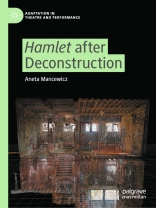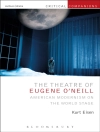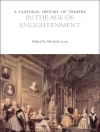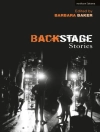Post-war European adaptations of Hamlet are defined by ambiguities and inconsistencies. Such features are at odds with the traditional model of adaptation, which focuses on expanding and explaining the source. Inspired by Derrida’s deconstruction, this book introduces a new interpretative paradigm. Central to this paradigm is the idea that an act of adaptation consists in foregrounding gaps and incoherencies in the source; it is about questioning rather than clarifying. The book explores this paradigm through seven representative European adaptations of Hamlet produced between the 1960s and the 2010s: dramatic texts, live theatre productions, and a mixed reality performance. They systematically challenge the post-Romantic idea of Hamlet as a tragedy of great passions and heroic deeds. What does this say about Hamlet’s impact on post-war theatre and culture? The deconstructive analyses offered in this book show how adaptations of Hamlet capture crucial anxieties and concerns of post-war Europe, such as political disillusionment, postmodern scepticism, and feminist resistance, revealing exciting connections between European traditions.
Daftar Isi
Chapter 1. Introduction.- Part I. Supplements of Action.- Chapter 2. Supplement.- Chapter 3. Rosencrantz and Guildenstern are Dead, Tom Stoppard.- Chapter 4. Ophelias Zimmer, Alice Birch and Katie Mitchell.- Chapter 5. Fortinbras Gets Drunk, Janusz Głowacki.- Part II. Différance: Machines and Mixed Realities.- Chapter 6. Différance.- Chapter 7. The Hamletmachine, Heiner Müller.- Chapter 8. Hamlet’s Lunacy, CREW.- Part III. Traces of Hamlet.- Chapter 9. Trace.- Chapter 10. Kitsch Hamlet, Saverio La Ruina.- Chapter 11. Factory, Igor Bauersima.- Chapter 12. Conclusion.
Tentang Penulis
Aneta Mancewicz is a Lecturer in Drama and Theatre at Royal Holloway, University of London, UK. Her research focuses on Shakespearean performance, digital technologies, and European theatre. She is the author of Intermedial Shakespeares on European Stages (Palgrave Macmillan, 2014) and Biedny Hamlet [Poor Hamlet] (2010). She also co-edited two collections of essays: Intermedial Performance and Politics in the Public Sphere and Local and Global Myths in Shakespearean Performance, both published by Palgrave Macmillan in 2018. As an associate dramaturg, she supported mixed reality adaptations of Shakespeare, such as CREW’s Hamlet (2017 and 2018) and Nexus Studios’ The Tempest (2020).












